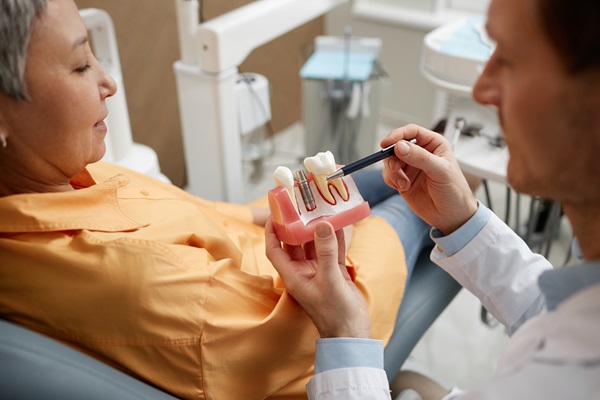Smile Confidently with Dental Implants

Dental implant surgery can bring back your stunning smile. Tooth loss makes eating, speaking, and even smiling difficult. It affects a person’s self-esteem. Getting implants can make you feel good about yourself again. Here are the details on how a dental implant can help you smile confidently again.
Why it is necessary
People who use removable restorations often complain about pain. The embarrassment of having dentures wiggle and fall out can be devastating to one’s self-esteem as well. Getting a dental implant is much like having a new tooth. This restoration replaces the entire tooth structure with more stability.
The degree of dental implant surgery will depend on the jawbone’s condition and the type of implant. This type of restoration may need other procedures. The complete fusion of the titanium rods with the jawbone and gum tissue will need a significant amount of time. An individual must prepare to devote three to six months to recovery. A dental implant can suit people who:
- Have fully developed jawbones
- Have at least one missing tooth
- Have good oral health
- Have healthy, dense jawbones
- Do not consume tobacco
- Want speech improvement
- Do not want to wear traditional dentures
- Do not have problems with bone healing
- Can devote many months to the whole process
What happens when getting a dental implant
This is an outpatient procedure that the patient must go through in different stages. First, the dentist may remove any tooth with severe damage. Assessing the patient’s jawbone will follow. The results will determine if the patient should get bone grafting.
Placing the dental implant will come next. Patients who had bone grafting must have full recovery before the implant surgery begins. Complete fusion and healing will take about three to six months after implant placement. The dentist will then place the connector or abutment. Installing the artificial crowns will follow after two weeks of healing.
About bone grafting
The dentist will assess the patient’s jawbone first. Bone grafting will be necessary if the jawbone is soft or thin. This surgery aims to thicken the area of the jawbone enough to support the dental implant. It will help prevent the restoration from failing. The graft will create a stronger foundation for the implant.
Rebuilding the jawbone is possible by placing a piece of good bone in the thinning or soft area. The dentist can take the bone graft from any healthy part of the body. The graft may also be a synthetic bone. The dentist can help the patient decide which type of graft will be ideal for the situation. Healing can take months for major grafting. Minor bone grafting can happen as the patient goes through dental implant surgery.
Preparing for the procedure
The dentist will scan the patient’s mouth first. An extensive dental exam can determine the number of teeth that will need implants. It can also tell the dentist the type of implant-supported restoration that suits the patient. Providing individual implants to replace more than three missing teeth may be extremely traumatic to the patient.
The dentist will review the patient’s medical history as well. This will include the patient’s prescription medications and supplements. The patient must disclose orthopedic implants or heart ailments. Taking antibiotics before the procedure may be necessary for some patients to help ward off infections. The information from the dentist’s assessment can help the dentist create a custom-fit treatment plan.
Discussing dental sedation methods will also be necessary. Some patients may need local anesthesia during dental implant surgery. Others may need more than that. There are patients who have dental fear. General anesthesia can help them go through the procedure. They may even have little to no memory of what took place. These patients must have designated drivers after the procedure.
Aftercare
Like any other type of surgery, getting a dental implant involves many stages. The discomforts after this surgery will include pain at the surgical site. Bruising and swelling of the skin, face, and gums also happen. There will also be minor bleeding.
The dentist will prescribe antibiotics and pain medications after the dental implant procedure. A soft diet will help the surgical site heal better. The dentist will often use self-dissolving stitches. The patient must go back to the dentist to remove the stitches if they do not dissolve on their own.
Dental implant surgery can bring back your brilliant smile
Losing a tooth can cause chaos to your dental health. It can also affect your quality of life. Replacing the lost tooth with a dental implant can provide you a stable bite, proper speech, and an attractive appearance again. Working with your dentist can bring about lasting, natural-looking results.
Request an appointment here: https://www.gledhilldental.com or call Gledhill Dental at (509) 800-8410 for an appointment in our Kennewick office.
Check out what others are saying about our dental services on Yelp: Dental Implants in Kennewick, WA.
Related Posts
Dental implants provide a durable and natural-looking solution for missing teeth, but they do not work on their own. An implant crown serves as the final step in this process, completing the restoration and restoring smile function, appearance, and confidence. They mimic the appearance and strength of natural teeth to integrate with the rest of…
A dental implants is widely considered the tooth replacement solution that most closely resembles a natural tooth in durability, functionality, and appearance. However, like natural teeth, dental implants require diligent and consistent care to ensure longevity. Incorporating proper dental implant care into your oral hygiene routine can prevent complications and keep your smile healthy for…
Full mouth dental implants are an option that many patients choose when they need to replace their missing teeth. Our smile is the first impression we have when meeting a new person. We all want that impression to be warm and welcoming. When our smile is somewhat imperfect, we tend to lack confidence and feel…
Dental implants can prevent problems resulting from tooth loss. Some people need these restorations because they do not want to use unstable, removable tooth replacements. Others want to have a natural look. Finding out your eligibility for this treatment is crucial in achieving your dental health goals. If you want to know if you are…


